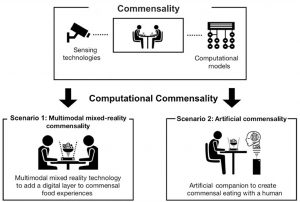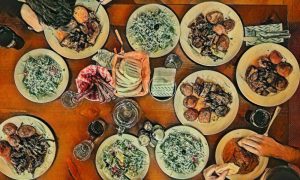Every time we eat, we craft our identities, perform relationships, and shape our communities, from the local to the global.

Eating Together Food, Eating Alone
Since long before the dawn of humanity, eating has been a social act. Some of our primate ancestors shared food. Early humans were more successful when they banded together to hunt; they enjoyed greater security when they cooked and ate their food together.
Farmers have long collaborated in a range of tasks, from chasing away the animals consuming their crops, to forming work parties in order to make some tasks possible and others easier or more pleasant.
Many are the foods that bear evidence of the human inclination to share company in preparation and consumption. The geographical origins of dumplings are hotly debated among food historians. Variants are found all over the world.

Traditional sizes, forms, and fillings vary from region to region, but they are generally a labor-intensive food. And in many places, this work has historically been done in groups — generally of women — sitting together, not only keeping one another company, but also passing on techniques, imitating and improving upon one another’s recipes and aesthetics.
Men, too, share the work of preparing food. In south Texas, to give just one example, Chicano men stand together around the grill, barbecuing the off-cuts of meat that are central to their working-class cuisine; through playful banter equating meat with manhood, they reinforce group solidarity.

To labor alone and, especially, to eat alone, is not only shameful in many cultural contexts, but also it is often considered monstrous or sub-human. In the villages of Mueda where I worked, there was a special word for one who ate alone: nkwaukanga. Such people were traditionally condemned as greedy, even ugly.
Highlights
- •
Food practices enable construction and maintenance of cultural, racial, and ethnic identities.
- •
Some traditional foods are perceived to have medicinal qualities and are consumed regularly.
- •
Traditional beliefs about the importance of foods for hot-cold balance and health affect daily food practices.
- •
Everyday multiculturalism, and multicultural social policies influence food practices in Singapore.











